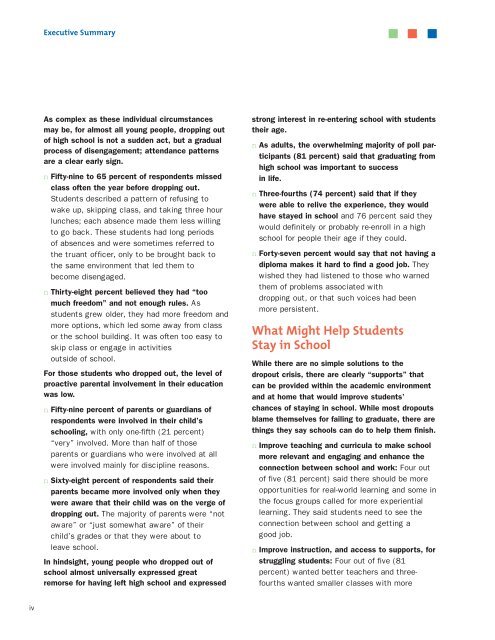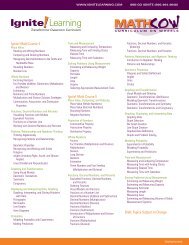The Silent Epidemic: Perspectives of High School ... - Ignite! Learning
The Silent Epidemic: Perspectives of High School ... - Ignite! Learning
The Silent Epidemic: Perspectives of High School ... - Ignite! Learning
Create successful ePaper yourself
Turn your PDF publications into a flip-book with our unique Google optimized e-Paper software.
iv<br />
Executive Summary<br />
As complex as these individual circumstances<br />
may be, for almost all young people, dropping out<br />
<strong>of</strong> high school is not a sudden act, but a gradual<br />
process <strong>of</strong> disengagement; attendance patterns<br />
are a clear early sign.<br />
n Fifty-nine to 65 percent <strong>of</strong> respondents missed<br />
class <strong>of</strong>ten the year before dropping out.<br />
Students described a pattern <strong>of</strong> refusing to<br />
wake up, skipping class, and taking three hour<br />
lunches; each absence made them less willing<br />
to go back. <strong>The</strong>se students had long periods<br />
<strong>of</strong> absences and were sometimes referred to<br />
the truant <strong>of</strong>ficer, only to be brought back to<br />
the same environment that led them to<br />
become disengaged.<br />
n Thirty-eight percent believed they had “too<br />
much freedom” and not enough rules. As<br />
students grew older, they had more freedom and<br />
more options, which led some away from class<br />
or the school building. It was <strong>of</strong>ten too easy to<br />
skip class or engage in activities<br />
outside <strong>of</strong> school.<br />
For those students who dropped out, the level <strong>of</strong><br />
proactive parental involvement in their education<br />
was low.<br />
n Fifty-nine percent <strong>of</strong> parents or guardians <strong>of</strong><br />
respondents were involved in their child’s<br />
schooling, with only one-fifth (21 percent)<br />
“very” involved. More than half <strong>of</strong> those<br />
parents or guardians who were involved at all<br />
were involved mainly for discipline reasons.<br />
n Sixty-eight percent <strong>of</strong> respondents said their<br />
parents became more involved only when they<br />
were aware that their child was on the verge <strong>of</strong><br />
dropping out. <strong>The</strong> majority <strong>of</strong> parents were “not<br />
aware” or “just somewhat aware” <strong>of</strong> their<br />
child’s grades or that they were about to<br />
leave school.<br />
In hindsight, young people who dropped out <strong>of</strong><br />
school almost universally expressed great<br />
remorse for having left high school and expressed<br />
strong interest in re-entering school with students<br />
their age.<br />
n As adults, the overwhelming majority <strong>of</strong> poll participants<br />
(81 percent) said that graduating from<br />
high school was important to success<br />
in life.<br />
n Three-fourths (74 percent) said that if they<br />
were able to relive the experience, they would<br />
have stayed in school and 76 percent said they<br />
would definitely or probably re-enroll in a high<br />
school for people their age if they could.<br />
n Forty-seven percent would say that not having a<br />
diploma makes it hard to find a good job. <strong>The</strong>y<br />
wished they had listened to those who warned<br />
them <strong>of</strong> problems associated with<br />
dropping out, or that such voices had been<br />
more persistent.<br />
What Might Help Students<br />
Stay in <strong>School</strong><br />
While there are no simple solutions to the<br />
dropout crisis, there are clearly “supports” that<br />
can be provided within the academic environment<br />
and at home that would improve students’<br />
chances <strong>of</strong> staying in school. While most dropouts<br />
blame themselves for failing to graduate, there are<br />
things they say schools can do to help them finish.<br />
n Improve teaching and curricula to make school<br />
more relevant and engaging and enhance the<br />
connection between school and work: Four out<br />
<strong>of</strong> five (81 percent) said there should be more<br />
opportunities for real-world learning and some in<br />
the focus groups called for more experiential<br />
learning. <strong>The</strong>y said students need to see the<br />
connection between school and getting a<br />
good job.<br />
n Improve instruction, and access to supports, for<br />
struggling students: Four out <strong>of</strong> five (81<br />
percent) wanted better teachers and threefourths<br />
wanted smaller classes with more








